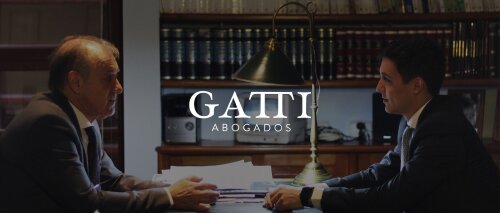Best Restructuring & Insolvency Lawyers in Argentina
Share your needs with us, get contacted by law firms.
Free. Takes 2 min.
Or refine your search by selecting a city:
List of the best lawyers in Argentina
About Restructuring & Insolvency Law in Argentina
Restructuring and insolvency law in Argentina provides a framework for individuals and businesses facing financial difficulties. It governs the processes that allow financially distressed companies or persons to either restructure their debts with creditors or proceed with formal liquidation. The primary aim is to balance the interests of debtors and creditors while promoting economic stability and protecting jobs where possible. Argentina has established legal procedures to facilitate proactive debt negotiations and, when necessary, orderly exits from the market.
Why You May Need a Lawyer
Dealing with financial distress, whether personal or business-related, often involves complicated legal and financial considerations. A lawyer specializing in restructuring and insolvency in Argentina can help in several situations, such as:
- Advising companies facing cash flow problems or mounting debts
- Guiding individuals at risk of insolvency or bankruptcy
- Representing creditors who need to recover unpaid debts
- Navigating court proceedings or out-of-court negotiations with creditors
- Explaining your rights and obligations under Argentine law
- Ensuring compliance with legal requirements to avoid additional liabilities
- Maximizing protection of personal or company assets
Local Laws Overview
The key legislation governing restructuring and insolvency in Argentina is the Ley de Concursos y Quiebras (LCQ), or Bankruptcy and Insolvency Law. This law provides procedures for two main scenarios: concursos preventivos (preventive reorganization) and quiebras (bankruptcy liquidation).
- Concursos preventivos: This process allows debtors to negotiate payment plans and restructure debts with creditor approval, enabling the business or individual to continue operating while resolving obligations.
- Quiebras: This is the formal bankruptcy process where, if restructuring is not feasible, assets are liquidated under court supervision to pay creditors.
Both procedures are overseen by insolvency courts and may involve a trustee (síndico concursal) appointed to manage the process. The LCQ also includes rules on the roles and rights of creditors, potential clawback of fraudulent or preferential transactions, and protection measures for employees.
Frequently Asked Questions
What is the main difference between restructuring and insolvency in Argentina?
Restructuring refers to attempts to reorganize and negotiate debts to help a business or person regain financial stability. Insolvency often refers to situations where debts cannot be paid, leading to formal bankruptcy proceedings and liquidation of assets.
Who can file for bankruptcy or restructuring in Argentina?
Both individuals and legal entities (such as companies or partnerships) can initiate preventive reorganization or bankruptcy proceedings under Argentine law.
What happens to my assets if I go bankrupt in Argentina?
In bankruptcy (quiebra), assets are generally liquidated under court supervision to pay outstanding debts to creditors. Some personal assets may be exempt from liquidation under specific circumstances.
Can creditors force a bankruptcy in Argentina?
Yes. Creditors can initiate involuntary bankruptcy proceedings against a debtor if they can demonstrate unpaid debts and certain legal requirements are met.
What is the role of the court and trustee in an Argentine insolvency process?
The court supervises the entire process to ensure fairness and legal compliance. The trustee manages estate assets, reviews claims, reports on progress, and negotiates with creditors.
Will entering into restructuring protect me from lawsuits by creditors?
Filing for concurso preventivo typically suspends most lawsuits and enforcement actions by creditors, giving the debtor time to negotiate repayment terms and protections while the process is ongoing.
How are creditors ranked in Argentina during bankruptcy?
Argentine law establishes priority classes for creditors, with certain claims (like employee salaries and tax debts) prioritized over unsecured debts.
How long does the insolvency process take in Argentina?
The duration can vary widely depending on complexity, the number of creditors, and whether assets need to be sold. Preventive restructurings can take several months, while full bankruptcy proceedings often last a year or more.
Can I keep my business running during restructuring?
In preventive reorganization, companies are usually allowed to continue operating under court protection while they negotiate solutions with creditors.
What risks are there if I do not follow proper procedures in restructuring or bankruptcy?
Failing to comply with legal requirements can result in personal liability for company directors, additional fines, potential criminal charges, or the loss of protection from creditors.
Additional Resources
If you need further information or assistance, consider contacting:
- Official Judiciary: National commercial courts in Argentina handle insolvency claims and petitions.
- Argentine Ministry of Justice and Human Rights: Offers guidelines and information regarding legal rights and obligations in insolvency cases.
- Professional legal associations: Registered lawyers and public counsel offer free or subsidized legal services in certain circumstances.
- Chambers of Commerce and Industry: Informational sessions and support services for businesses facing financial difficulties.
- Accountants and auditors: Specialized professionals can assist with financial assessments and compliance matters related to restructuring.
Next Steps
If you are facing financial distress as an individual or a business in Argentina, taking action quickly can help preserve your rights and options.
- Consult with a specialized restructuring and insolvency lawyer to assess your unique situation and receive personalized advice.
- Collect and organize all relevant financial documentation, including creditor lists, contracts, and recent financial statements.
- Request a preliminary evaluation to determine if a preventive restructuring, negotiated agreement, or formal bankruptcy is appropriate.
- Act promptly, as delays can increase risks and limit available solutions.
- Remember that each scenario is unique, and professional advice is essential to protect your interests and comply with Argentine law.
Legal assistance is highly recommended to navigate the complexities of restructuring and insolvency in Argentina. Reaching out early to a qualified attorney can help you achieve the most favorable outcome.
Lawzana helps you find the best lawyers and law firms in Argentina through a curated and pre-screened list of qualified legal professionals. Our platform offers rankings and detailed profiles of attorneys and law firms, allowing you to compare based on practice areas, including Restructuring & Insolvency, experience, and client feedback.
Each profile includes a description of the firm's areas of practice, client reviews, team members and partners, year of establishment, spoken languages, office locations, contact information, social media presence, and any published articles or resources. Most firms on our platform speak English and are experienced in both local and international legal matters.
Get a quote from top-rated law firms in Argentina — quickly, securely, and without unnecessary hassle.
Disclaimer:
The information provided on this page is for general informational purposes only and does not constitute legal advice. While we strive to ensure the accuracy and relevance of the content, legal information may change over time, and interpretations of the law can vary. You should always consult with a qualified legal professional for advice specific to your situation.
We disclaim all liability for actions taken or not taken based on the content of this page. If you believe any information is incorrect or outdated, please contact us, and we will review and update it where appropriate.
Browse restructuring & insolvency law firms by city in Argentina
Refine your search by selecting a city.
















